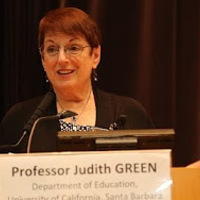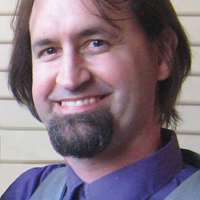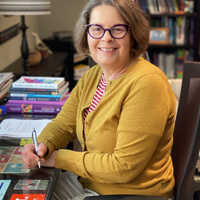
Tony Yeigh
Tony Yeigh BA(Theology/Philosophy) (Pacific Union College, USA), BPych (Hons) (UNE, Australia), DipED (SCU, Australia), Phd (SCU). Dr Yeigh is an experienced lecturer with a demonstrated history of working in the higher education industry. Skilled in intercultural communication, English as a Second Language (ESL), research design, lecturing, and lesson planning, he is also a strong education professional with a Doctor of Philosophy (PhD) focused in Educational Psychology from Southern Cross University. His research interests include Blended Learning, School Improvement, School Leadership, Initial Teacher Education and "wicked" problem solving.
Phone: 61 2 6620 3659
Address: New South Wales, Australia
Phone: 61 2 6620 3659
Address: New South Wales, Australia
less
Related Authors
Judith L Green
University of California, Santa Barbara
Michael Spivey
University of California, Merced
Andreas Umland
National University of "Kyiv-Mohyla Academy"
David Zyngier
Southern Cross University
Jo Tondeur
Vrije Universiteit Brussel
Andrea Hellman
Missouri State University
João Lopes
Universidade do Minho
David Seamon
Kansas State University
Ilana S Horn
Vanderbilt University
Beth Ferri
Syracuse University
InterestsView All (19)










Uploads
Papers by Tony Yeigh
This research focus is important because it can add to the to the voice of traditional stakeholders, including parents, school leaders, teachers and the students themselves, who have had significant opportunities to voice their ideas and advice about how student learning takes place (NSW Department of Education, 2020). This broad scope of input into student learning is valued because it supports the principle of inclusion, which contributes significantly to the improvement of teaching and learning in general (Chandra Handa, 2020). The current research is also necessary, however, because students experiencing an ID remain underrepresented in the collection of student voices that have been educationally recognised to date. In this respect the current study confirms that students experiencing an ID can engage constructively in discussions about their learning, and are able to contribute unique and insightful recommendations concerning the way they are taught mathematics.
during practicum by supervising teachers or observers who may
provide subjectively different evaluations known to lack reliability
and validity. This article examines a way to shift the evaluative
emphasis to use of affective-reflective skills through use of a protocol
that also serves to improve the emotional literacy and confidence
of PSTs. The article explores variations of a novel protocol in
which the observer plays the non-judgmental role of a facilitator,
with the PST using self-determined emotion (affect) as a basis for
self-evaluation of their own teaching performance in group and
self-reflection. These protocol variations are explored across PST
programs at six different universities using the notion of engaging a
PST’s emotional states as critical moments in their lesson. A subsequent
reflection involves interpretation and pedagogical analysis
of those affect-based moments. The overall impact was twofold: the
reflection helped the PSTs determine changes in their teaching
approaches that improve confidence; and, the protocol provided
a self-evaluation of teaching performance that placed the PST in the
central decision-making role. These findings have implications for
program design, teacher educator pedagogy and future research.
This research focus is important because it can add to the to the voice of traditional stakeholders, including parents, school leaders, teachers and the students themselves, who have had significant opportunities to voice their ideas and advice about how student learning takes place (NSW Department of Education, 2020). This broad scope of input into student learning is valued because it supports the principle of inclusion, which contributes significantly to the improvement of teaching and learning in general (Chandra Handa, 2020). The current research is also necessary, however, because students experiencing an ID remain underrepresented in the collection of student voices that have been educationally recognised to date. In this respect the current study confirms that students experiencing an ID can engage constructively in discussions about their learning, and are able to contribute unique and insightful recommendations concerning the way they are taught mathematics.
during practicum by supervising teachers or observers who may
provide subjectively different evaluations known to lack reliability
and validity. This article examines a way to shift the evaluative
emphasis to use of affective-reflective skills through use of a protocol
that also serves to improve the emotional literacy and confidence
of PSTs. The article explores variations of a novel protocol in
which the observer plays the non-judgmental role of a facilitator,
with the PST using self-determined emotion (affect) as a basis for
self-evaluation of their own teaching performance in group and
self-reflection. These protocol variations are explored across PST
programs at six different universities using the notion of engaging a
PST’s emotional states as critical moments in their lesson. A subsequent
reflection involves interpretation and pedagogical analysis
of those affect-based moments. The overall impact was twofold: the
reflection helped the PSTs determine changes in their teaching
approaches that improve confidence; and, the protocol provided
a self-evaluation of teaching performance that placed the PST in the
central decision-making role. These findings have implications for
program design, teacher educator pedagogy and future research.
Save 30% on the new book from #SCUTeachLab, Improving Schools with Blended Learning, when you purchase via https://www.routledge.com/9780367407384, by entering PBC30 at the checkout.
Offer valid until the 31 October.
For more information visit: www.routledge.com/9780367407407
In this book, the authors consolidate the current state of Blended Learning research, by defining what is meant by Blended Learning before discussing specific technologies used in Blended Learning, the professional development required of teachers and how to implement whole of school Blended Learning regimes in schools. The book includes descriptions of popular Blended Learning models with real-world examples of their implementation, addressing both student and teacher perspectives. This book will serve as a guide to hastening the progress of Blended Learning towards the improvement of student outcomes in a world of continuous technological innovation and social change.
This book includes a series of themes, concepts, ideas and principles that were formulated and reported during the Teacher Education Dialogue (TED) Conference, staged at the Coffs Harbour campus of Southern Cross University in 2012. The TED conference was convened in order to provide a platform for practising teachers and teacher educators to come together and explore innovative ideas about teacher education leading into the 21st century.
Featuring articles by; Richard Smith; Bruce Knight; John Dekkers, David Turner; Angelina Ambrosetti; Tania Broadley; Elaine Sharplin; Sue Ledger; Elizabeth Toohey; John Ward; Jon Hart and Jenny Johnston.
David Lynch is Professor of Education at Southern Cross University. He is the author of ten books on teacher education related matters and is one of Australia's leading teacher education innovators.
Tony Yeigh is Lecturer in Education at Southern Cross University and has a background in Special Education support and programming. His research centres on cognitive models of the mind and the bearing these have upon learning.